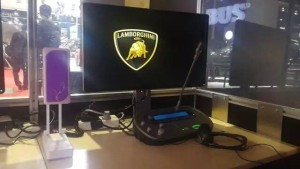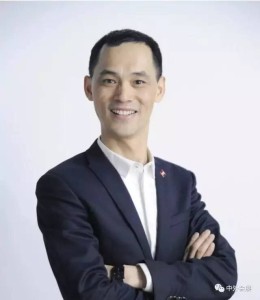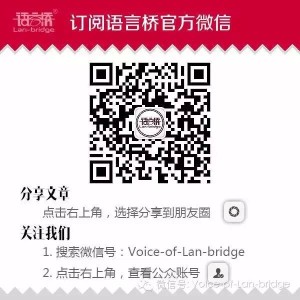- +44 (0)20 8334 8266
- uk@lan-bridge.com
- 中文
The Voice of Lan-bridge: Conference report (26/04/2017)
Spring is here!
Another week has passed. Working hard can be invigorating, as Lan-bridge’s employees have found lately, as they busily throw themselves into our world of events and translation!
Shanghai Auto Show – Lamborghini new car conference (Shanghai, 19th April, 2017)
At the recent Shanghai Auto Show’s Lamborghini new car conference, Lan-bridge provided the iconic Italian sports car company with simultaneous interpretation, further cementing our two companies’ cooperation!




Recently, China International Conference Exhibition interviewed Chinese Translation Association’s deputy director of the committee, Lan-bridge Group’s Chairman Michael Zhu. The article below originally appeared in Chinese in China International Conference Exhibition.

In recent years, the increase in international conferences and exhibitions held in China has gradually brought with it more foreign exhibitors, which has led to a growing demand for language services. A number of outstanding language service enterprises have emerged, of which Lan-bridge is the leading company. Lan-bridge is one of the top ten translation groups in Asia, and top three in China. It also has the largest national network of any translation company in China. The group has also earned awards in the following catergories in recent years: “top ten translation services nationwide”, “the most influential brand of English education industry institutions”, “national excellent translation services business”, “national language service industry brand enterprises”, “translation services in China integrity Unit” and “China Translation Association standardized market outstanding contribution award” (amongst others).
How did Lan-bridge achieve this status? Where do its advantages lie? With these questions in mind, in late March, correspondents from Beijing’s China International Conference Exhibition interviewed the Translation Association of China’s deputy director and chairman of Lan-bridge Group, Michael Zhu.
6 major areas of business; the obvious advantages of language services
According to Michael’s introduction, Lan-bridge Group Ltd. (hereafter, Lan-bridge) was founded in the year 2000 in Chengdu. It now has offices in four municipalities (Beijing, Shanghai, Tianjin and Chongqing), four provincial cities (GUnagzhou, Wuhan, Chengdu, and Xian) and two county-level cities (Zhengzhou and Kunming), as well as an office in London and one in Sweden. Having these branches all over the country and internationally provides an effective guarantee for the company’s globalization strategy and business development plans, and is also an important factor in enabling it to provide a fast, high-quality and efficient service. In 2004 Lan-bridge gained the ISO9001: 2008 quality management system certification, and in 2013 the ISO27001: 2005 information security management system certification.
Lan-bridge’s current business has six main areas: translation, conferences and exhibitions, language talent training, human resources outsourcing, language technology, and localization. The primary areas are translation, conferences and training; and of these conferences and exhibitions is the core – Lan-bridge provides a one-stop service for organisers and participants of exhibitions.
Michael Zhu told journalists that the main aspects of conference and exhibition services are simultaneous, consecutive, and escorting interpretation. The latter involves helping the delegate with their travel and accommodation arrangements as well as accompanying them to the conference. Besides interpretation, Lan-bridge’s other main area is translation. If a company wants to market itself, translate its website, name cards, brochures, contracts, etc., then Lan-bridge has excellent resources to do so. Lan-bridge’s one-stop language service also includes volunteer training, human resource services, exhibition stand and booth design, and site management.
Lan-bridge now has an increasingly varied range of language capabilities and covers 51 Languages and 139 language pairs. The languages they most often provide services for are those used most frequently in international trade: English, Russian, Spanish, Portuguese, German, Japanese, and Korean.
Lan-bridge’s outstanding experience lies in two aspects:
Firstly, it has established a standardized work-flow and standards, which it uses to select and train translators and interpreters. Working in Lan-bridge requires strict adherence to six parts of an overall process. No matter which employee it is, each must learn all the parts of the process according to the standards required by its criteria. Many translators are very enthusiastic about gaining industry experience and knowledge, especially with regards to particularly high-level meetings, but it is always important to select who is suitable according to their experience and background. Michael cites an example to illustrate this: Not long ago, Lan-bridge provided services for an aircraft engine seminar held in Beijing. Using their own workflow, they selected an interpreter who had not only graduated from the PLA Foreign Languages institute but had also previously studied engines and had work experience in this field. The interpreter performed excellently on the day and earned the customer’s praise.
Secondly, Lan-bridge has a large number of in-house employees (over 500), including English, Russian, French, Spanish, Japanese and Portuguese linguists, which means they have the world’s major languages covered, and they have the capability to work on a variety of large projects across languages and industries.
Now, some employees insist on taking on specific roles, for example, some might say: “I’d like to focus just on interpreting now, not translating.” In fact, the company’s translation workflow is familiar to the whole company, and also aides the interpreters. For example, once a Lan-bridge interpreter attended an international insurance law meeting, which was set to feature an essay with over 100,000 words. During the preparation phase of the meeting, Lan-bridge communicated with the customer in advance, and translated the essay from beginning to end, which gave the interpreter a better understanding insurance law. It is good work habits and work processes that produce good performances and results.
A classic case for a translation company
Michael told reporters that Lan-bridge’s experiences in international conferences have provided many interesting and illuminating cases which he can share.
At the 11th China International Investment and Trade Fair held in Zhengzhou in March, more than 20 countries and regions, 200 overseas enterprises and 1,000 domestic large, medium and small enterprises met in the General Assembly to hold negotiations. In preparation for this event, Lan-bridge cooperated with many colleges and universities in Henan Province to select the best English, French, Portuguese, Czech, Russian, Japanese, Korean, Polish, Italian, Thai and Cantonese language students to help meet the requirements of the conference. They also provided business etiquette training, financial professional training and rehearsed practical simulations, before providing the event with professional simultaneous, consecutive and escorting interpretation services.
Lan-bridge provides another representative service case, the “European Enterprises in China Portal” project. This project, which was launched in Beijing on 21st March, is a commercial support project initiated and funded by the European Union, designed to guide European companies towards visiting and investing in China. Lan-bridge provided language services for this project, including simultaneous interpretation, press conferences, consecutive translation for one-to-one business talks during the exhibition, and post-show visits, amongst others. At the same time, they also translated the European Enterprises’s brochure and other marketing material, as well as edited its layout (so that it looked as good in Chinese as it did in its source languages) and printed it.
The EU Project Incubation Center hosts business matching activities annually, and each event requires hundreds of interpreters. Two books also accompany the event, one to represent the Chinese and one to represent the European side. Before the businesses are paired, Lan-bridge collects all the information then translates the Chinese information into English, and the the English into Chinese. Preparatory work is done early so that the translation work will successfully be completed on time.
Discussing development: the translation industry’s future.
As the manager of the translation business that deals with thousands of meetings per year, what does Michael make of the development prospects of the exhibition industry as a whole, and what obstacles lay in its way? He discussed this with reporters openly.
With regards to the industry’s future development, the prospects are bright. There are two areas to discuss here, the ‘hardware’ areas and the ‘software’ ones. He elaborates: “At present, some exhibition companies and organizations pay more attention to the ‘hardware’aspect of service, such as exhibition stands. They build amazing booths, but then ignore the ‘software’ aspects of events, such as language services, which are vital for the organizers to focus on if they want to create successful interactions between delegates. Therefore, their exhibitions don’t always produce the best results.”
Michael states that in the translation industry, one obstacle lies in the customer’s lack of understanding of the value of translation. For example, though they are receiving 800 yuan worth of service, customers are only willing to pay 300 yuan, which hinders the progression of the overall quality of service within the industry. Michael uses an example to further illustrate his point: most couriers charge less than SF Express, but they can’t bean SF Express for efficiency or speed, nor can they guarantee a 24 hour service.” Lan-bridge’s goal is to be the SF equivalent in the language industry, to provide high-quality and cost-effective services.” Michael says.
Discussing the development of future enterprises, Michael says that Lan-bridge plans to set-up new five branches in China. He believes that the in the future the exhibition industry will show greater diversification, and exhibitions will consist of an increasing number of participants who speak foreign languages, which will create more demand for language services.
Follow us on WeChat:

Translated by Kain Jagger





